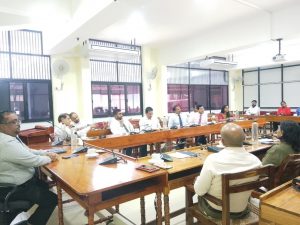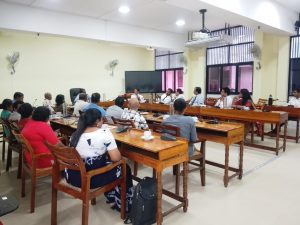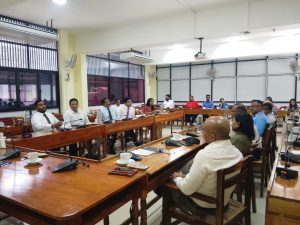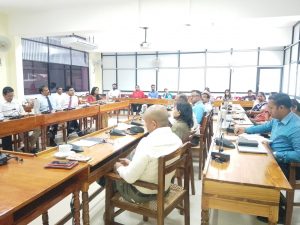



Collaboration to set up a R&D Hub for Industry and Entrepreneurship Development - NEDA & Open University of Sri Lanka (OUSL)
In today's rapidly evolving global landscape, research and development (R&D) serves as the backbone of innovation and technological advancement. It is the process through which organizations, industries, and nations explore new ideas, develop groundbreaking technologies, and enhance existing products and services. R&D is fundamental to driving economic growth, improving quality of life, and addressing complex societal challenges.
The government has identified that R&D is essential for developing the country's economy and fostering a renaissance across various fields.
Implementation of Research and Development Components by the Government of Sri Lanka
The Government of Sri Lanka has taken significant strides in enhancing its research and development (R&D) landscape through various strategic initiatives and policy frameworks. The primary goal is to foster innovation, drive economic growth, and ensure sustainable development.
National Initiative for R&D Commercialization (NIRDC)
One of the landmark initiatives is the National Initiative for R&D Commercialization (NIRDC), launched to promote innovation and entrepreneurship across various sectors. This initiative aims to commercialize near-complete or completed research projects, transforming them into marketable, value-added products and services. The NIRDC is chaired by the Secretary to the President and the Senior Advisor to the President, Prof. Gomika Udugamasooriya.
Support for Grassroots Innovators
Recognizing the potential of grassroots-level innovators, the government has introduced mechanisms to support, nurture, and commercialize their ideas. This includes providing gap-filling funding for near-completed R&D projects and matching investors for project commercialization.
Implementation of Research and Development Components by the Government of Sri Lanka
The Government of Sri Lanka has taken significant strides in enhancing its research and development (R&D) landscape through various strategic initiatives and policy frameworks. The primary goal is to foster innovation, drive economic growth, and ensure sustainable development1.
Increased Funding and Public-Private Partnerships
The government has increased funding for R&D and established public-private partnerships to leverage resources and expertise from both local and international investors. This approach aims to create a robust ecosystem for innovation and technology development.
Sustainability Standards and Reporting
In line with global sustainability goals, the government has unveiled a roadmap for adopting sustainability standards. This includes the Sri Lanka Sustainability Disclosure Standards, which aim to enhance transparency and align with global sustainability requirements.
Aligning with the government manifesto, the Chairman and officials of the National Enterprise Development Authority have initiated a collaboration with the Open University of Sri Lanka to prepare a roadmap for supporting Small and Medium Enterprises (SMEs) and startups in Sri Lanka. A fruitful discussion was held with the Vice-Chancellor, Prof. P.M.C. Thilakerathne, Prof. Nalin Abeysekera, Dean of the Management Faculty, and other academics from the faculty on 15/01/2025. The discussion continued with the perspectives of academia towards developing a new roadmap for SME development. To streamline the tasks and responsibilities, a Memorandum of Understanding (MOU) will be signed in February 2025.
Meeting Outcomes Summary
- Research & Development (R&D)
The meeting emphasized the importance of advancing R&D to drive innovation and economic growth. Key initiatives include increased funding, public-private partnerships, and incentives for innovators. The goal is to foster a knowledge-driven economy by empowering local talent and promoting global collaboration.
- Big Data for Decision Making
The adoption of big data analytics was highlighted as a crucial tool for informed decision-making of the Ministry and Organisations who serve Industry and Entrepreneurship development. Organizations are encouraged to integrate data-driven strategies across all business functions to enhance, policy, strategic planning and implementation, operational efficiency, customer understanding, and value addition. The focus is on leveraging data to facilitate policy making, Strategic planning, plan implementation and performance management (KPIs).
- Monitoring Achievements of Objectives/KPIs
A robust Monitoring and Evaluation (M&E of KPIs) system was discussed to ensure accountability and results-oriented governance. The system aims to track progress against targets, facilitate timely corrective actions, and promote transparency. This approach is expected to lead to sustainable improvements in development outcomes.
- Setting Up of Incubators
The establishment of incubators was identified as a key strategy to support startups and entrepreneurs. Incubators will provide resources, mentorship, and networking opportunities to help convert innovative ideas into successful businesses. The goal is to create a robust startup ecosystem that fosters entrepreneurial growth and success in both manufacturing and service sectors.
- Branding & Communication
Effective branding and communication strategies were discussed to enhance the visibility and impact of initiatives. The focus is on creating a strong brand identity, engaging with stakeholders, and communicating the value of projects and programs effectively. This will help in building trust and attracting support from various stakeholders. Additionally, NEDA and the university have reached an understanding regarding the full utilization of a well-equipped media unit to communicate with and address entrepreneurs, aligning with the entrepreneurial renaissance.
- Linking All Universities on Industry and Entrepreneurial Development National Effort
The meeting highlighted the importance of collaboration between universities and industries to drive entrepreneurial development. Initiatives include creating partnerships, fostering innovation hubs, and providing students with real-world experience through internships and projects. The aim is to align educational programs with industry needs and promote a culture of entrepreneurship. The Open University of Sri Lanka will act as the R&D Hub in collaboration with NEDA.





